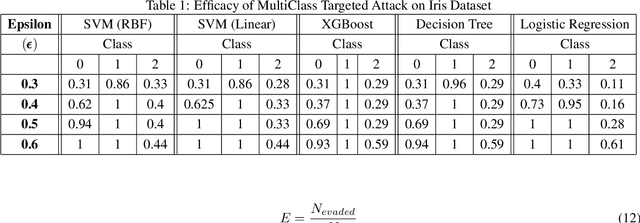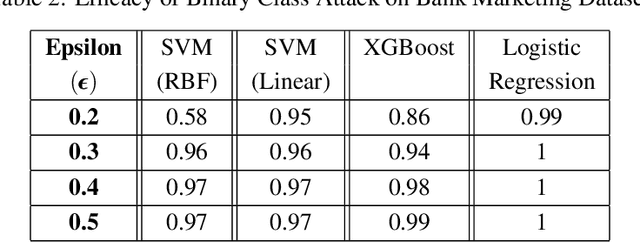Vidit Khazanchi
MISLEAD: Manipulating Importance of Selected features for Learning Epsilon in Evasion Attack Deception
May 02, 2024



Abstract:Emerging vulnerabilities in machine learning (ML) models due to adversarial attacks raise concerns about their reliability. Specifically, evasion attacks manipulate models by introducing precise perturbations to input data, causing erroneous predictions. To address this, we propose a methodology combining SHapley Additive exPlanations (SHAP) for feature importance analysis with an innovative Optimal Epsilon technique for conducting evasion attacks. Our approach begins with SHAP-based analysis to understand model vulnerabilities, crucial for devising targeted evasion strategies. The Optimal Epsilon technique, employing a Binary Search algorithm, efficiently determines the minimum epsilon needed for successful evasion. Evaluation across diverse machine learning architectures demonstrates the technique's precision in generating adversarial samples, underscoring its efficacy in manipulating model outcomes. This study emphasizes the critical importance of continuous assessment and monitoring to identify and mitigate potential security risks in machine learning systems.
Attacks on Third-Party APIs of Large Language Models
Apr 24, 2024Abstract:Large language model (LLM) services have recently begun offering a plugin ecosystem to interact with third-party API services. This innovation enhances the capabilities of LLMs, but it also introduces risks, as these plugins developed by various third parties cannot be easily trusted. This paper proposes a new attacking framework to examine security and safety vulnerabilities within LLM platforms that incorporate third-party services. Applying our framework specifically to widely used LLMs, we identify real-world malicious attacks across various domains on third-party APIs that can imperceptibly modify LLM outputs. The paper discusses the unique challenges posed by third-party API integration and offers strategic possibilities to improve the security and safety of LLM ecosystems moving forward. Our code is released at https://github.com/vk0812/Third-Party-Attacks-on-LLMs.
 Add to Chrome
Add to Chrome Add to Firefox
Add to Firefox Add to Edge
Add to Edge